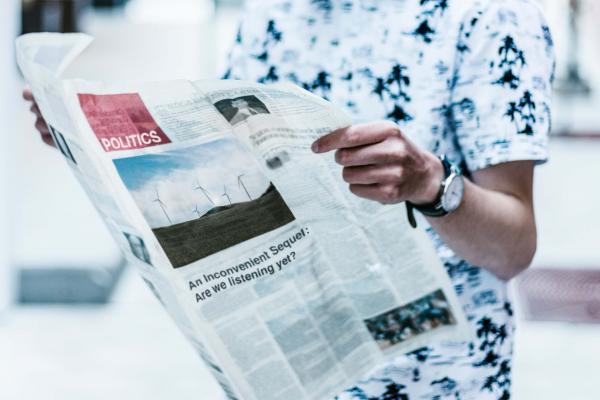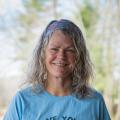I wasn’t expecting to weep at a conference — but something about this gathering was different.
Maybe it was the venue in the historic Ebenezer Baptist Church in Atlanta, Ga., the sanctuary filled with 2,000 people — brown, black, white, indigenous, and immigrant.
Maybe it was the Rev. William Barber II’s preaching that touched me with the moral call to climate justice, in partnership with Al Gore, whose organization Climate Reality Project brought this audience together for a three-day training.
Later that night, I realized why the message felt personal: Barber pushed me to reframe my conversations with my daughters about climate justice in this country. I teach environmental education at a small college in North Carolina, but the way I communicated at home around the kitchen table needed a transformation.
I had heard Rev. Barber, founder of the Moral Monday movement in North Carolina and co-founder of the national Poor People’s Campaign, preach twice before. But I’d never heard his words applied to the climate crisis before this moment.
“The right time to do good is right now,” Barber repeated, interspersing history lessons as a compass. He reminded us of the moral costs as fossil fuel industries have been allowed to poison people and places: “This is the wrong use of our humanity. It’s not good. It’s sin. It’s wrong, and we must challenge it, because the right time to do good is right now.” And everyone repeated that refrain with him, jumping to their feet with a public joy I’d never witnessed at any environmental meeting in the past 30 years. It might take the force of a revival to wake us to our present reality.
“Don’t you forget it’s always been about fusion,” he bellowed, leaning into the podium, elaborating on his theory of fusion politics that avoided labels like liberal and conservative, left or right. He urged us to reclaim the narrative and build a movement of solidarity in order to face the enormity of the climate crisis.
“Don’t let them tell you the civil rights movement was just the black church,” he said. “It was black and brown and white and yellow. Standing against environmental injustice is God’s work. Let us join together y’all!”
And that is when tears fell down my face, as I sat next to an African-American woman with a Justice First baseball cap in her hand. That same week, young people I knew held school strikes to demand action; one of my former students, Kelsey Juliana, was suing the federal government with 20 other youth for their constitutional right to a healthy life. Yet we live in a country where only one in five people hear anyone discuss climate change on a monthly basis and where the government has known about the impact of fossil fuels for more than 50 years.
With my students at Warren Wilson College, I tried to model diverse partnerships lasting nearly two decades with neighbors in our valley. At an alternative public school, we co-taught gardening and cooking lessons with high school students who faced real challenges ranging from poverty to pregnancy. Across the street, my students facilitated activities in Spanish immersion classrooms at the local elementary school. We came together as community members around shared needs.
But around the kitchen table at home, my seventh grader and I discussed the news of the day often in partisan terms reflecting our current reality but not the future she’ll need. Before the 2016 election, she volunteered her own informal tally that only three children in her class were “for” Hillary Clinton and the rest were “for” Donald Trump. She couldn’t understand why adults would vote for a bully, she said, but many were parents of her friends. And politics didn’t affect who played together at recess.
This year, as I cooked supper, she’d contribute the news from CNN 10 in social studies class. “Look at this video of Democrat Alexandria Ocasio-Cortez,” I’d respond, my eyes gleaming with hope. I’d share other headlines about funding cuts or voter restrictions by Republicans, like I was narrating the score of a basketball game. I wasn’t misleading her, but it was time to also communicate some vision without labels. I’d read that nearly half of both Democrats and Republicans thought those from the other party were “ignorant” and “spiteful,” according to a 2018 survey.
Barber calls for fusion coalitions that use moral language, rather than partisan terms, to claim what’s right versus wrong. It’s not about denying accountability for misdeeds like gerrymandering or outright lying but calling for language understood on the playground: Do what is right. It’s a cry for common decency.
In this context, voter suppression becomes a climate issue, as those most likely to be denied the right to vote are those most likely to be impacted by warming temperatures. As Rebecca Solnit writes, climate action is “a movement to protect life,” not a separatist ideology pitting one type of person against another.
My two daughters, 13 and 19, will need to work across all lines to help heal our consciousness and restore our climate, no matter what they do with their lives. Where we stand with the poor, the hungry, the sick, the immigrant, and the earth could determine our collective strength to fight back, now and years ahead.
Through their youth group, my children have seen local examples of fusion, such as 12 Baskets Cafe, a community hub in Asheville, N.C., that brings people together around a shared meal. But I am eager to highlight coalitions at regional and national scales in the past and present, such as the Poor People’s Campaign.
After three days of listening to inspiring speakers at the Climate Reality training, I passed through South Carolina en route to the mountains of Western North Carolina. At a red light, I stopped next to a blue Ford pick-up truck with a barking German Shepherd in a pen in the back and a bumper sticker that read, “Not a Liberal.” For the first time, I saw that message as a possibility, not a threat.
As I drove, I thought of the retired Lt. General Russel Honoré, founder of the GreenARMY in Louisiana, who told us, “Do you like drinking polluted water? Eating polluted fish? Nobody wants dirty water and air. That’s how you find common ground.”
When I pulled into my driveway at sunset, an orange glow bathed the blue sky, showcasing this one illuminated earth. Our current times feel more like reality television than ordinary days to me, but my fusion politics now can begin at home. Because the right time to do good is right now.
Got something to say about what you're reading? We value your feedback!







